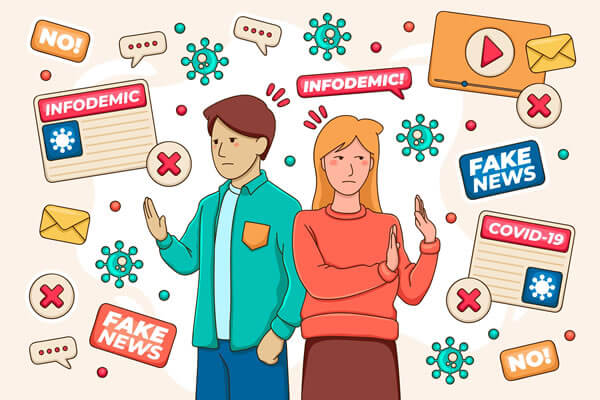Healing yourself and your relationships after the election
By Michael Oberschneider, Psy.D.
Mindfulness is the concept of being 100 percent present in the moment, while accepting all aspects of what that moment is – without criticism, blame, or judgement. But with this presidential year being so contentious, and with such heated vitriol between the two major candidates and political parties, it hasn’t been easy to be mindful. Throw into the mix the emotional weight and upset of COVID-19 along with the civil unrest of recent months, and the Nation has never felt more divided.
While people with conservative and liberal political beliefs have always disagreed, the rising rancor and polarization over Trump and Biden has strained and even ended a lot of personal and professional relationships.
Surveys and polls demonstrate just how divided things have become. In a 2020 survey conducted by the Pew Research Center, the majority of Trump and Biden supporters report having few friends who back the opposing candidate.
As a psychologist who has spent the last several months assisting patients with their upset regarding either candidate, I’ve put together a list of DO’s and DONT’s in hopes of helping folks to heal their damaged relationships.
DO …
Prepare. For any kind of change, preparation is essential, so start by making a conscious decision to adopt a more open attitude and sense of purpose in your relationships when it comes to politics. As the old adage goes, “one’s perception is one’s reality,” and being understanding, compassionate, and open to seeing all sides of an issue first, takes preparation.
Breathe. Take a few deep breathes to begin to deal with the stress, anxiety and negative thoughts that have overcome you this election year. Mindful breathing will help you calm down when you become upset about how you think someone you know is wrong about Trump or Biden. So, the next time someone offends you by saying something against your candidate or political position, take some deep breaths.
Understand. Is it more important to be right about how good or bad you think Trump or Biden are than it is to be friends with someone you care about? You very likely didn’t “Friend” – on-line or off-line – someone you care about because of their voting practices, so why “Unfriend” them now because you don’t agree with them politically?
I recommend that we try to appreciate that the motivation of someone’s vote is determined by several factors: our upbringing, our gender, our age, our race, etc. Even our neurology seems to play a part in how we vote. Similarities across several well-conducted research studies have found that conservatism and liberalism is correlated with specific regions of the brain. So, when it comes to red states or blue states, our gray matter may matter more than we once believed.
When you find yourself getting defensive or upset with someone over politics, think about two or three things that you have in common with that person.
Accept. Gaining insight and self-awareness around problems allows you to make the important changes you might want to make in your life, including being more accepting of your family members, co-workers, and friends when it comes to politics. Getting yourself to a place where you can accept differences, will lead you to experiencing more positive thoughts, and you will be a much more agreeable person.
Let go. Deciding to let go of something very upsetting usually takes patience and time, but after working on acceptance, it will be your next step.
DON’T …
Rub it in. Nobody likes a know-it-all. So, reminding others that you are right about Trump or Biden will only upset those with opposing views.
Keep fighting. There’s also little to no value in continuing to debate, argue or fight over Trump or Biden. Fighting will only cause you more conflict in your relationships and more negative emotions. The election is over. We will all need to figure out a way to get along after things are finalized, regardless of who we voted for.
Overdose on news. Given that this is an election year, the media coverage has been non-stop. It seems that Fox News and CNN, for example, report something controversial and attention grabbing about Trump or Biden or members of the Republican or Democratic Party every five minutes, and we’ve all been conditioned to check-in way too frequently.
Take the bait. The next time someone says something disparaging about your candidate or political party, reacting emotionally may seem like the right thing to do, but defense on defense will just escalate things. Instead of reacting to an attack such as “Trump’s a narcissist,” or “Biden’s senile,” simply be aware of how you’re feeling emotionally.
Beat up on yourself for taking the bait. Practicing mindfulness requires effort and patience. So, the next time you react strongly to someone for challenging your political position, don’t spend too much time punishing yourself. Allow yourself to become aware of what happened and why, and then forgive yourself.
While mindfulness as a practice will likely help you with many of your Trump or Biden woes, it’s not a panacea. It’s also okay to have friends who you disagree with politically. Only you can decide on that.
The significant political disharmony between conservatives and liberals we’ve sadly become accustomed to likely won’t go away any time soon. How you manage yourself internally and in relation to others is in your control. Guided meditation is a wonderful way to practice mindfulness. American author and teacher of mindfulness, Susan Kaiser Greenland, created a wonderful 7-minute guided meditation on how we all have something in common. If politics continue to upset you, perhaps Ms. Greenland’s meditation could be helpful: https://soundcloud.com/susankaisergreenland/just-like-me.




Michael Oberschneider, Psy.D. “Dr. Mike” is a clinical psychologist in private practice.
He can be reached at 703-723-2999, and is located at 44095 Pipeline Plaza, Suite 240, Ashburn.


